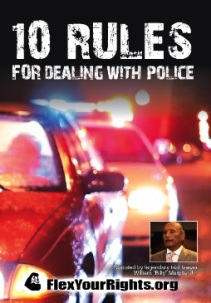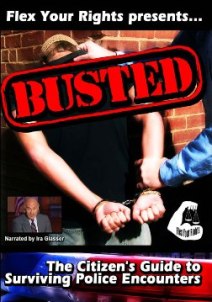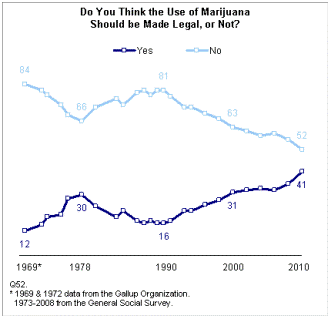Efforts to further reform the Higher Education Act's anti-drug provision came frustratingly close before becoming an accidental casualty of the last minute negotiations over the health care budget reconciliation bill. But it isn't dead yet -- advocates will continue to try to get it passed during this session of Congress.
There is a chance that the entire West Coast could be voting on legalizing marijuana in November. We've already reported on California and Oregon -- see below -- and this week, we take a look at the legalization initiative campaign in Washington state.
StoptheDrugWar.org is pleased to be the first drug policy organization to offer this important new video to our members -- your donations will support our work of building the movement and fueling public debate, too.
The prohibition-related violence in Mexico took an ominous turn this week as supposed cartel armies attacked military bases in the north. And then there's the typical toll of dead cops, dead narcos, and dead civilians.
A police drug lab scandal broadens in San Francisco, somebody stole the drug evidence in suburban Atlanta, a former US Customs agent heads for prison, and yes, yet another pair of jail guards go down.
Support for medical marijuana is broad and deep among the American public, and support for general pot legalization continues to trend upward, although we're not quite over the top nationally, a new poll finds.
The drug czar doesn't want to talk about what the federal response to marijuana legalization in California might be. Let's hope he has to talk about it come November 3.
What are asset forfeiture laws and practices like where you live? A scathing new report on "Policing for Profit" will help you find out.
After years, the DEA has yet to move against the psychedelic member of the mint family, salvia divinorum. But that hasn't stopped various states from moving to regulate it or -- more often-- ban it outright. Minnesota could be the next to ban it, but Maryland has a less freaked-out idea: Just limit it to adults.
Millions of people have viewed -- and benefited from -- the film "Busted: The Citizen's Guide to Surviving Police Encounters." The new Flex Your Rights film, "10 Rules for Dealing with Police," has taken things to the next level, in more ways than one.
After nearly nine years of US and NATO military occupation, Afghanistan is now not only the world's largest opium producer, but also the world's largest cannabis producer, according to a new report from the UNODC.
The latest legal drug craze in Britain is mephedrone, a synthetic stimulant derived from the active ingredient in khat. It probably won't stay legal for long, as the prohibitionist impulse remains strong. But that won't necessarily stop people from using it.
Events and quotes of note from this week's drug policy events of years past.
"Embarrassing Typo on Anti-Legalization Site," "Drug Czar Doesn't Want to Discuss California's Legalization Effort," "Sting Says End the Drug War," "Medical Marijuana on South Park Tonight," "Drug Cartels Are Terrified of Marijuana Legalization," "Illegal Growers Are Terrified of Marijuana Legalization," "An Argument to Avoid Making, Part 2."
Do you read Drug War Chronicle? If so, we need your feedback to evaluate our work and make the case for Drug War Chronicle to funders. We need donations too.
Apply for an internship at DRCNet and you could spend a semester fighting the good fight!
Community Access, Inc. is seeking a Harm Reduction Specialist for its New York City office.
Efforts to deepen already existing reforms to the Higher Education Act (HEA) anti-drug provision hit a brick wall during last minute negotiations last month over the health care reform bill, which included the Student Aid and Financial Responsibility Act (SAFRA). The Democratic Senate leadership removed the HEA reform and various other items they feared would not survive Republican procedural challenges the night before the Senate voted on the budgetary reconciliation bill related to the package.
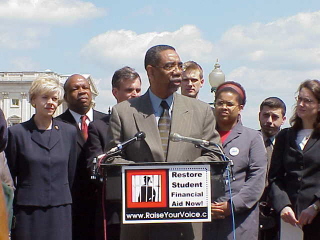
2002 press conference with 10 members of Congress calling for repeal of the drug provision
That doesn't mean HEA reform is dead this session, but advocates will have to push hard to get it passed. They say they plan to do just that.
The child of congressional drug warrior Rep. Marc Souder (R-IN), the HEA anti-drug provision, also known as the Aid Elimination Penalty, was enacted in 1999. In its first, hard-line version, it barred students with a drug conviction -- no matter how minor -- from receiving federal financial aid for specified periods. More than 200,000 students have been adversely affected by the HEA Aid Elimination Penalty since its inception.
The harsh and punitive measure sparked opposition from students and their supporters and was a key factor in the creation of Students for Sensible Drug Policy (SSDP). It also sparked the creation of the Coalition for HEA Reform (CHEAR), an umbrella group including dozens of higher education, civil rights, and drug reform organizations, which worked Capitol Hill throughout the '00s to lobby for reform. Advocates scored a partial success in 2006, when Congress voted to make the penalty applicable only to drug convictions that occurred while students were enrolled in school and receiving aid.
The reforms included in the SAFRA this year would have gone further toward completely eliminating the Aid Elimination Penalty. Under the measure approved by the House, only students convicted of a drug distribution would have been subject to losing financial aid eligibility. But the section of the bill in which that reform was included got removed as part of a maneuver to include the rest of the legislation -- health care and student combined -- in the reconciliation process, avoiding the need to amass 60 votes.
"The Democrats took out a bunch of stuff at the last minute they didn't think could survive various Senate procedural hurdles," said Bill Piper, national affairs director for the Drug Policy Alliance, a key player in CHEAR. "The HEA drug provision was one of many items eliminated -- for reasons that had nothing to do with the issue itself."
"The HEA reform was tucked into the budget reconciliation bill as part of SAFRA," noted Aaron Houston, government affairs director for the Marijuana Policy Project (MPP), another key player in CHEAR. "But under Senate rules, only items that could be shown to produce budget savings were allowed, and our provision costs money, so that was a problem. It would have been subject to a valid point of order on the Senate floor."
But while the HEA aid elimination penalty didn't make the final cut in the reconciliation process, Houston saw positive signs in what did -- and did not -- take place in Congress this year.
"The Republicans could have called for a roll call vote on this provision, they could have tried to call for a roll call vote at the committee level, but they didn't do that," he noted. "As time goes by, I am confident that we are facing an increasingly receptive environment, not because the Republicans have seen the light, but because they are beginning to understand that it is not in their political interest to grandstand on these drug issues. They know it would alienate the Tea Party types, many of whom are fairly libertarian-leaning, and a lot of whom got their start in politics via activism in the Ron Paul campaign. While Republicans used to grandstand on this issue, now they don't see it as politically expedient, and that suggests how much progress we've made," Houston argued.
David Borden, executive director of StoptheDrugWar.org and one of the principal CHEAR organizers since its founding, also saw positive signs. "The good news is that HEA reform almost passed last week," he said. "And this time we didn't even have to remind members of Congress about the issue; it's part of the agenda, they figured out how much they thought they could achieve politically, and they even deflected Rep. Souder's challenges in committee and on the House floor to do that much. And it was in there until the very last day."
Can that progress be transformed into an actual victory on HEA reform this year? There is still a chance, advocates said.
"The next step is to try to get this in by the end of the Congress," said Houston. "We're still hopeful, but I would be hesitant to say what the vehicle for it would be."
"Obama is talking about how he wants to do another education bill this year before the election," said Piper. "It's mainly about reforming No Child Left Behind, but will also contain some of his other priorities, like the reward program for the states, and they seem pretty serious about pushing that. We're hopeful that we can get HEA reform included in that, and we are contacting members of Congress about that. But at this point, it's far from clear the Democrats can get 60 votes to pass an education bill, with or without HEA reform."
HEA reform came frustratingly close to fruition in last month's health care brouhaha. And a side effect of that battle was to cost HEA reform what would otherwise have been a likely vehicle for passage. Now, all activists can do is grit their teeth and return to the fight. Such are the ways of Washington.
back to top
There is a chance, albeit an outside one, that the entire West Coast could go green in November. Last week we noted that the California tax and regulate initiative had made the ballot, and reported on the Oregon Cannabis Tax Act initiative's ongoing effort to make the ballot. This week, we turn our attention to Washington state, where yet another marijuana legalization initiative campaign is underway.

Seattle Hempfest, 2009
Sponsored by
Seattle Hempfest head Vivian McPeak, marijuana defense attorneys Douglass Hiatt and Jeffrey Steinborn, and journalist-turned-activist Philip Dawdy and organized under the rubric of
Sensible Washington, initiative
I-1068 would legalize marijuana by removing marijuana offenses from the state's controlled substances act.
As the official ballot summary puts it:
"This measure would remove state civil and criminal penalties for persons eighteen years or older who cultivate, possess, transport, sell, or use marijuana. Marijuana would no longer be defined as a 'controlled substance.' Civil and criminal penalties relating to drug paraphernalia and provisions authorizing seizure or forfeiture of property would not apply to marijuana-related offenses committed by persons eighteen years or older. The measure would retain current restrictions and penalties applicable to persons under eighteen."
"We've had to go this route because the legislature isn't getting the job done," said Dawdy. "We had a decriminalization bill and a tax and regulate bill, and neither one could even get through committee. We've basically hit a brick wall in Olympia, and as activists, we're tired of waiting. The state is spending way too much on arresting, prosecuting, and sometimes jailing people for marijuana crimes. We have 12,000 people arrested for marijuana offenses every year. It's got to stop. If the legislature can't get it done, we have the initiative process."
The initiative campaign needs to gather 241,000 valid signatures by July 2. According to the campaign, they are shooting for 350,000 signatures and are about 20% of the way toward their goal. So far, it's an all-volunteer effort.
"We've been battling the weather, which has been horrible, and that makes it really difficult to work outdoor events," said Dawdy. "You can't gather very many signatures when it's raining. But we are starting to get inundated with signature petitions, and we remain confident we can get enough to make the ballot."
The campaign is finding support in some unusual places, Dawdy said. "The issue is really popular here, and one of our best hits was at a gun show. Libertarians and conservative Democrats go to those things. We're probably going to have a gun show coordinator for western Washington, and try to target those events. And we can use retired police officers instead of stinky hippies."
There are no signs yet of any organized opposition, but Dawdy said that was no surprise. "I would have been surprised if any popped up this early. I wouldn't expect it until we make the ballot, and then there will probably be some law enforcement group showing up to float the gateway theory and all that stuff."
"We're doing this on a shoestring," Dawdy explained. "We're getting online donations, a few in-kind donations, a few thousand-dollar checks, but funding from the national organizations hasn't really gelled yet. But the medical marijuana campaign in 1998 didn't get any big money until May, and they got on the ballot and one. I think we can do the same thing."
Unlike California and, to a lesser degree, Oregon, there is little money to be had from the Washington medical marijuana community, Dawdy said. "It isn't like California here," he said. "There are no $70 eighths, it's very much a nonprofit kind of system. What profits there are are small and underground, and they're underground for a reason."
National Organization for the Reform of Marijuana Laws (NORML) executive director Allen St. Pierre said that the national NORML board of directors had endorsed the initiative and that local chapters were involved in the effort, but that NORML wouldn't do much more than that until -- and unless -- the initiative makes the ballot, something St. Pierre suggested he doubted would happen.
"I'm very skeptical about their prospects," he said. "These guys said from the beginning they didn't have any money, and no initiatives not funded by billionaires have actually made it, yet they still decided to move forward. I told them NORML can't do much until they get on the ballot -- it's not worth the time and effort to point people towards initiatives that haven't made the ballot."
"We're getting sick and tired of being written off by people 3,000 miles away," retorted Dawdy. "That's just not fair, and it suggests that they don't really know Washington state despite coming out for three days each summer for Hempfest. People here are sick and tired of the situation, and legalization and reform are issues that poll strongly. People back East don't appreciate this and they don't understand this is one of the few issues where you can actually make the ballot with an all-volunteer effort."
That's not the only flak the initiative campaign is getting. One of the leading drug reform groups in the state, the ACLU of Washington has refused to endorse the initiative on the grounds that it does not include a regulatory system for marijuana. In a February statement, the Washington ACLU's lead person on drug policy, Allison Holcomb, laid out its arguments:
"The ACLU supports marijuana legalization and will continue to work toward that goal. However, we will not be supporting I-1068 because it does not provide a responsible regulatory system."
"We believe that full marijuana legalization will be accomplished only through implementation of a controlled regulatory system. Marijuana should be placed under controls that not only remove criminal penalties for adult marijuana use but also address the public's concerns about health and safety. It is unrealistic to regulate it less than tobacco or alcohol."
"We're aware that some believe that I-1068's passage would force the legislature to adopt such regulations in 2011."
"However, the ACLU isn't willing to support an incomplete initiative in hopes that the Legislature will fix it. We believe that when seeking support of such an important and complicated issue, the public should be presented with a carefully considered and well-vetted proposal."
But the initiative campaign argues that Washington's stringent single-issue rule for initiatives blocks it from concocting an elaborate regulatory scheme. Passage of the initiative would force the legislature to then enact regulations, they said.
"All our initiative does is remove criminal penalties for adult use, possession, and cultivation," Dawdy explained. "That will put it back in the hands of the legislature to come up with sensible civil regulations. We would have loved to do regulations in the initiative, but the single issue rule on initiatives in our state is very strict."
The Washington ACLU also argued that support for legalization is less than solid and that a defeat at the polls would be "a significant setback" for the drug reform movement.
And so things stand as April begins. Initiative campaigners have about 90 days to gather the requisite signatures and make the ballot. Maybe then they'll begin to get some respect. And maybe then they can join California, and hopefully, Oregon, in turning the West Coast green.
back to top
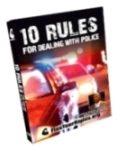 It's here. The "10 Rules for Dealing with Police" DVD. Donate $30 or more and get a free copy mailed within one week. It's here. The "10 Rules for Dealing with Police" DVD. Donate $30 or more and get a free copy mailed within one week.
|
| From the creators of the classic, Busted: The Citizenâs Guide to Surviving Police Encounters (2003), our friends at the group Flex Your Rights are now releasing their new achievement, 10 Rules for Dealing with Police. Because StoptheDrugWar.org (DRCNet) members like you supported Busted, you've earned the first chance to see this important new DVD.
10 Rules for Dealing with Police, a 40-minute educational drama, is the most sophisticated and entertaining film of its kind. Narrated by the legendary trial lawyer William "Billy" Murphy, Jr. (from HBO's The Wire), 10 Rules depicts innocent people dealing with heavy-handed policing tactics used every day in the United States.
Through extensive collaboration with victims of police abuse, legal experts and law enforcement professionals, Flex Your Rights has developed a powerful multi-language (English, Spanish & Arabic) resource that provides proven survival strategies for dealing with racial profiling and police abuse.
Do you know what your rights are if you're stopped by police? Most people don't, and the consequences can be severe. From simple misunderstandings to illegal searches and excessive force, a bad police encounter can happen to anyone. But after watching 10 Rules for Dealing with Police, you'll be more confident and better prepared to handle every kind of police situation.
Get 10 Rules today!
Learn How To...
- Deal with traffic stops, street stops & police at your door
- Know your rights & maintain your cool
- Avoid common police tricks
- Prevent humiliating searches
Bonus Features
- 10 Rules for Non-citizens (en Español)
- Q&A with 10 Rules Creators
- Spanish & Arabic Subtitles
We still offer Busted on DVD, too. Add $25 to your donation for a total gift of $55 and get both videos: 10 Rules AND Busted. Or get two copies of either DVD for $55. It's your choice. You can also add BOTH of our popular anti-prohibitionist t-shirts for your donation of $100 -- a terrific value while you support the important work of StoptheDrugWar.org. Get yours today!
StoptheDrugWar.org is the #1 source for the latest news, information and activism promoting sensible drug law reform and an end to prohibition worldwide. With 1.8 million unique readers in 2009 and with leading news and commentary sources making use of our web site on a regular basis, StoptheDrugWar.org is advancing the drug war debate and growing the drug policy reform movement, helping to start or spark the creation of organizations like Students for Sensible Drug Policy, Flex Your Rights and many others. Our strategy is working, and your generous donation will make a difference during these economically challenging times. Thank you for helping -- we look forward to sending your copy of 10 Rules!
|
| StoptheDrugWar.org is the #1 source for the latest news, information and activism promoting sensible drug law reform and an end to prohibition worldwide. Your donations support our work of building the movement and fueling the public debate! |
10 Rules testimonials:
"The 4th Amendment has been on life support during both the Bush-Cheney and Obama administrations. The clearest and most constitutionally-grounded guide for all of us against this government contempt for our 4th Amendment rights is 10 Rules for Dealing with Police. It should be shown in schools, in local legislatures and in Congress.
Nat Hentoff
"10 Rules will educate all individuals about how to safely exercise their rights and protect themselves against abusive and illegal police behavior. It should be required viewing in high schools across the country."
Prof. Angela J. Davis, Professor of Law, American University Washington College of Law & former Director of the DC Public Defender Service, Author, Arbitrary Justice: The Power of the American Prosecutor
"Chronic disregard for civil rights is tearing apart the fabric of America. Flex Your Rights has hit the nail on the head in this hard-hitting instructional video."
Mike Gray, Author of The China Syndrome and Drug Crazy
"I believe 10 Rules will make an extraordinary contribution to the cause of social justice. Only those police officers who disregard the law have something to fear from its message. As an ex-cop, I thank Flex Your Rights for all you've done and continue to do."
Norm Stamper, Ph.D., Former Chief of the Seattle Police Department & Author of Breaking Rank: A Top Cop's Expose of the Dark Side of American Policing
"I read the 10 Rules screenplay and am thoroughly pleased. It is well written, and I believe it realistically and fairly grasps the issue of racial profiling. Go forward!"
Rev. Reginald T. Jackson, Executive Director, Black Ministers' Council of New Jersey & Pastor, St. Matthew A.M.E. Church
"10 Rules is an outstanding screenplay that resonates with authenticity, ripples with humor, and draws blood with its pointed examination of law enforcement in our cities. America's urban youth will love this movie, which talks straight and provides crucial, relevant advice on how to use America's unique Constitutional protections. Two thumbs up."
Eric E. Sterling, Esq., President, Criminal Justice Policy Foundation & Adjunct Lecturer in Sociology, George Washington University
"Good community policing is impossible when officers disrespect constitutional rights. 10 Rules will help citizens understand their rights and ensure that law enforcement is professional and accountable to the public."
Ronald E. Hampton, Executive Director of the National Black Police Association & former Community Police Officer for the Washington, DC Metropolitan Police Department
|
|
back to top
by Bernd Debusmann, Jr.
Mexican drug trafficking organizations make billions each year smuggling drugs into the United States, profiting enormously from the prohibitionist drug policies of the US government. Since Mexican president Felipe Calderon took office in December 2006 and called the armed forces into the fight against the so-called cartels, prohibition-related violence has killed over 18,000 people, with a death toll of nearly 8,000 in 2009 and over 2,000 so far in 2010. The increasing militarization of the drug war and the arrest of several high-profile drug traffickers have failed to stem the flow of drugs -- or the violence -- whatsoever. The Merida initiative, which provides $1.4 billion over three years for the US to assist the Mexican government with training, equipment and intelligence, has so far failed to make a difference. Here are a few of the latest developments in Mexico's drug war:

Ciudad Juárez (courtesy Daniel Schwen, Wikimedia)
Near the town of General Trevino, Nuevo Leon, the decapitated body of a local police chief was found inside a car alongside the body of his brother. Heriberto Cerda was the police chief of the nearby town of Agualeguas. His killers left his head on his lap. The two men had been reported missing on Thursday. The windshield and drivers windows had the letters "C.D.G" written in blood, indicating that the killings were the work of the Gulf Cartel. The incident comes one day after Mexican Marines were involved in a large firefight in another Nuevo Laredo town, Cerralvo. That incident occurred after Marines ordered gunmen in a six-vehicle convoy to stop and were answered by gunfire, leading to the deaths of six suspected drug traffickers.
In Sonora, the police chief of the border city of Nogales was ambushed and killed by gunmen armed with AK-47's. Additionally on Friday, gunmen in Ciudad Juarez attacked a hotel used by federal police officials, killing one and wounding two others. Earlier that day, a police investigator was gunned down in a residential area of the city.
Saturday, March 27
In Morelia, Michoacan, two police officers were shot dead at a gas station. Two other unidentified men were found dead at the scene as well. One of the officers had previously been suspended from duty, and the other was apparently off duty. The two men had apparently gone to a gas station to purchase beer when they were attacked. Additionally, in Acapulco, a man whose hands were bound was found shot to death in a car.
Monday, March 29
In Durango, gunmen killed ten young people at a roadblock in the "golden triangle" region where the states of Durango, Chihuahua and Sinaloa intersect. The ten individuals, ranging in ages from 8 to 21, were killed by gunfire and grenade blasts as they tried to speed through an improvised roadblock. In other news, Mexican authorities arrested a member of Los Aztecas gang in connection with the March killings of three people linked to the US consulate in Ciudad Juarez.
Around the town of Santa Catarina, Nuevo Leon several people were reported killed in various incidents. Among the dead were two people gunned down in a motel along the highway to Saltillo, and a police officer found dead in a burning patrol car. In another incident, a group of gunmen attacked an army convoy in an attempt to free a prisoner who had been detained Saturday with 13 kilos of cocaine. The gunmen were traveling in a five-vehicle convoy and were heavily armed with automatic weapons and grenades. In the twenty-minute firefight that ensued, two soldiers and two civilians were wounded. After the incident, the army detained six individuals who were disguised as members of the municipal police.
In Sinaloa, six people, including a police agent, were found dead. In one incident, gunmen barged into a hospital in the town of Los Mochis and shot dead a young man who had been wounded in an earlier incident. In another part of Sinaloa, a decapitated body was found along the road from Pericos to the small town of Badiguarato, which is known as the "cradle of capos" for the large number of high-level drug traffickers which were raised in the area, most notably Sinaloa Cartel boss Joaquin "El Chapo" Guzman.
In other parts of Mexico, three policemen were killed in Chihuahua, two people were killed in Quinta Carolinas, five in the Ciudad Juarez area, two in Tamochi, three in Chilpancingo, one in Acapulco, four in the state of Mexico, and one in Jalisco.
Monday, March 29
In Morelos, four decapitated bodies were discovered alongside a road stretching from Cuernavaca to Acapulco. A note was left at the scene threatening American-born drug trafficker Edgar Valdez Villareal. This indicates that the killings are somehow related to the ongoing power struggle between Villareal and Hector Beltran-Leyva for leadership of the Beltran-Leyva Cartel, which was left without a leader after the December killing of Arturo Beltran-Leyva by Mexican naval commandos. Additionally, two brothers were found shot dead in a house in the town of Ahuatepec, near Cuernavaca.
Tuesday, March 30
In Reynosa, Tamaulipas, soldiers clashed with gunmen in at least five city neighborhoods. At least six people were killed in the fighting, and twelve people were taken into custody. At least two of the dead were civilians caught in the crossfire, and two were soldiers. During clashes in the Loma Linda sector of the city, several grenade detonations were reported. In Tampico, Tamaulipas, three men were reported killed in an exchange of gunfire between two rival groups. Tamaulipas has recently seen a drastic increase in violence as the Zetas Organization battle their former masters, the Gulf Cartel.
Thursday, April 1
In the states of Tamaulipas and Nuevo Leon, gunmen mounted seven large, coordinated attacks on seven locations, including two army bases. Eighteen people were reported killed in the fighting. In a rare frontal attack, the gunmen attacked in military style unit-formations with armored trucks, automatic weapons, and fragmentation grenades. In several locations, gunmen reportedly parked trucks and SUV's outside military bases and streets in an effort to block the movement of troops to and from garrisons. One soldier was lightly injured in the fighting.
During the fighting, soldiers captured 54 assault rifles, 61 grenades, RPG's, eight homemade IED's, and six bulletproof vehicles.
Total Body Count for the Week: 123
Total Body Count for the Year: 2,446
Total Body Count for 2009: 7,724
Total Body Count since Calderon took office: 18,757
Read the last Mexico Drug War Update here.
back to top
A police drug lab scandal broadens in San Francisco, somebody stole the drug evidence in suburban Atlanta, a former US Customs agent heads for prison, and yes, yet another pair of jail guards go down. Let's get to it:

evidence room of opportunity
In San Francisco,
prosecutors may be forced to drop as many as 1,400 drug cases in a growing scandal at the police drug lab. That number includes as many as 400 cases where people have already been convicted and are in drug rehab programs. Some 500 cases have already been dropped, although prosecutors say they may refile charges in some cases when independent testing is done. The lab was shut down March 9 after the department learned of allegations that veteran lab tech Deborah Madden had stolen and used cocaine held as evidence at the lab last year. Now, police are acknowledging that Madden may have stolen other drugs, including Oxycontin. She has yet to be charged. Other lab techs may have been involved in misdoings as well. Defense attorneys have reported the lab saying it had tested drug samples when it appears that the samples remain untouched. Stay tuned on this one.
In Lawrenceville, Georgia, drugs have gone missing from the Gwinnett County Police narcotics locker. The theft was discovered March 19 after an audit of the locker. The Gwinnett County Police have asked the Georgia Bureau of Investigation to determine who stole the unspecified amount of drugs. In the past year, only 10 police supervisors have had access to the locker, and currently, only three can get into it. Last year, then narcotics and vice unit supervisor Lt. David Butler was busted for a similar theft from the narcotics locker.
In Brownsville, Texas, a former US Customs agent was sentenced Wednesday to 12 years in prison for taking bribes to allow designated vehicles carrying drugs or illegal immigrants pass through his US port of entry inspection lane in Brownsville. Jose Raul Montano Jr. pleaded guilty to bribery, drug trafficking, and immigrant smuggling charges in November. Prosecutors said he made tens of thousands of dollars in the scheme.
In St. Louis, a city jail guard pleaded guilty Tuesday to a reduced charge after being indicted for smuggling heroin into the jail. Marilyn Denise Brown, 54, pleaded guilty to one count of attempting to possess heroin. Brown admitted meeting an undercover officer and accepting a package she believed contained heroin. She was one of three city jail guards busted in a joint effort by the St. Louis Police and the DEA. The other two have already been convicted and sentenced to prison. Brown admitted meeting an undercover officer and accepting a package she believed contained heroin.
In Folsom, California, a Sacramento State Prison guard pleaded guilty Wednesday to smuggling drugs and cell phones into the prison for inmates. Domingo Garcia, 40, admitted receiving a $1,500 payment from one inmate for bringing him pot and $1,300 from another inmate for bringing him cell phones. He pleaded guilty to three felony counts and faces a one-year jail sentence.
back to top
A new poll by the Pew Research Center for the People and the Press has found that nearly three out of four Americans (73%) support legalizing the medicinal use of marijuana, while fewer than one out of four (23%) oppose it. Support is broad and solid, spanning all major political and demographic groups, and is equally high in states that do and do not already have medical marijuana laws.
The poll comes with 14 states and the District of Colombia, representing about one-fourth of the US population, already having approved medical marijuana. Several other states, including New York, South Dakota, and Wisconsin could join the list this year, and medical marijuana has been an active issue in another dozen or so state legislatures this year.
The poll identified concerns about medical marijuana. Nearly half (45%) of respondents said they would be "somewhat concerned" or "very concerned" if a medical marijuana dispensary opened in a local retail district, and about the same number (46%) said that allowing medical marijuana made it easier for people to obtain marijuana even if they didn't have a legitimate need. But only 26% said that bothered them. Not surprisingly, opponents of medical marijuana legalization were most likely to cite such concerns.
When it comes to general marijuana legalization, support is much lower than for medical marijuana and is still a minority position. The Pew poll found that 41% or respondents supported legalization, while 52% opposed it. The good news is that figure is the highest since Pew started polling on the question in 1969 and it continues a steady upward climb in the past two decades.
After support for legalization peaked at 30% in 1978, then bottomed out at 16% in 1990, support grew steadily, surpassing the 1978 level in 2000 (31%), and reaching 38% in 2008. It has grown by three percentage points in the last two years. The Pew numbers are similar to a Gallup Survey conducted last October that showed 44% support for legalization.
Unfortunately, the Pew poll does not contain a regional breakdown of support. In California, an initiative has already made the ballot; in Oregon and Washington initiatives are still in the signature-gathering stage.
The polling reveals significant demographic divides. A majority of under-30s (58%) support legalization, while support declining steadily with age. For those 30 to 49, support was at 42%, for 50 to 64, 40%, and for those 65 and older, support dropped dramatically to 22%.
There are differences between the sexes. Men are almost evenly divided on the question (45% yes, 47% no), while 57% of women oppose legalization.
An even higher percentage of Republicans (71%) oppose legalization, while Democrats are evenly divided, and liberal Democrats show majority support (57%) for legalization. Among independents, 49% support legalization. Among both Democrats and independents, support has increased dramatically in the past decade. Ten years ago, only 29% of Democrats and 35% of independents supported legalization.
The poll found that 40% of respondents had tried marijuana, and that people who had tried marijuana were much more likely (64%) to support legalization, than those who had not (25%).
Bottom line: We're not quite there yet nationally, but the trend line points to national majority support for general marijuana legalization within a decade.
back to top
Office of National Drug Control Policy (ONDCP -- the drug czar's office) head Gil Kerlikowske declined to directly answer a question about how the federal government would respond if California voters passed the Tax, Regulate and Control Cannabis Act, the marijuana legalization initiative sponsored by Oaksterdam entrepreneur Richard Lee. Kerlikowske's no comment came in a Thursday webcast on ABC News' Top Line program.
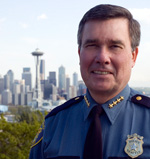
Gil Kerlikowske in his Seattle days
Kerlikowske said he wouldn't speculate on how the Obama administration would respond to a legalization victory in November. "Since it hasn't passed -- right now it would be improper to speculate on what the federal government's role is," he said.
The Obama administration has made it clear it would respect the rights of medical marijuana patients and providers in states where it is legal, but it is not at all clear that it would respond in the same way to legalization for personal use.
When prodded, Kerlikowske said the federal government could respond in a variety of ways, including filing lawsuits to litigate differences between state and federal drug laws. "You can envision a lot of different things," he said.
Let's hope that come November, the question is no longer hypothetical and the administration will be forced to grapple with the question of how to deal with Californians having voted to free the weed. Then things could get really interesting.
back to top
State and local law enforcement agencies in states that direct that seized assets go into the state general fund -- instead of into the hands of the seizing agency -- are increasingly turning their booty over to the federal government in a bid to keep their hands on the loot, according to a new report from the libertarian-leaning Institute for Justice. So-called "equitable sharing" between local cops and the feds nearly doubled between 2000 and 2008, from slightly more than $200 million to $400 million.

US Dept. of Justice assets forfeiture program logo -- helping state, county and local police departments evade the law
The report,
Policing for Profit: The Abuse of Civil Asset Forfeiture said that the trend toward "equitable sharing" is most pronounced in states that limit the use of proceeds from asset forfeitures. Similarly, in states where property owners are presumed innocent, law enforcement is more likely to collaborate with the feds to take advantage of looser federal asset forfeiture standards.
"These results demonstrate not only that federal equitable sharing is a loophole that state and local law enforcement use to circumvent strict state laws, but also that pursuit of profit is a significant motivator in civil forfeiture actions," the report found. "Simply put, when laws make civil forfeiture easier and more profitable, law enforcement engages in more of it."
The report also grades the 50 states on how well asset forfeiture laws protect the rights of citizens and provides an "evasion grade" measuring the degree to which state and local law enforcement bypass limits in state laws in order to keep the profits from seized assets for themselves. It was a dismal exercise, with only three states -- Maine, North Dakota, and Vermont -- receiving a combined grade of B or higher. The other 47 states all received C's or D's.
The lowest-graded states overall, with both poor laws and aggressive resort to "equitable sharing," are Georgia, Michigan, Texas, Virginia, and West Virginia.
back to top
At least 17 states have passed laws regulating salvia divinorum, most of them with outright bans on its possession and distribution. Now, two more states, Maryland and Minnesota, are poised to join them, the former with legislation limiting its possession to adults and the latter with an outright ban.

Salvia leaves (photo courtesy Erowid.org)
Salvia, a Mexican member of the mint family, is a powerful, fast-acting, short-live hallucinogen. Traditionally used for shamanic purposes in Mexico, it has in the past few years developed a following among youthful experimenters and sophisticated psychonauts alike.
While the DEA has been monitoring salvia as a "drug of concern" for the past nine years, it has yet to move to add it to its list of controlled substances. But since 2004, when Delaware became the first state to ban salvia, more and more states have moved to fill the regulatory void.
Minnesota may be the next to respond to salvia by prohibiting it. The state Senate Monday passed SF 2773, which makes possession of any amount of salvia or its psychoactive ingredient, salvinorin A, guilty of misdemeanor and anyone selling salvia guilty of a gross misdemeanor. A companion measure, HF 2975, has passed the House Public Safety and Oversight Committee and awaits a House floor vote.
Carol Falkowski, director of the alcohol and drug abuse division at the Minnesota Department of Human Services told the Minnesota Daily the federal government had not regulated salvia because of a lack of evidence of its risks. "They don't have a preponderance of evidence about the negative consequences," she said, supporting the bill.
Maryland is taking a more enlightened approach. On Monday, the state Senate passed SB 17, which prohibits the distribution of salvia or salvinorin A to anyone under 21. Companion legislation has passed the House Judiciary Committee and awaits further action.
The bill is an improvement over a similar bill offered last year. Following the lead of Ocean City, which banned salvia several years ago, last year's bill would have simply criminalized the possession of distribution of the plant.
But last year, the ban bill ran into opposition led by the Drug Policy Alliance, which lobbied legislators with information about salvia's research potential and relative safety. It looks like that effort paid off.
back to top
(We reprint Phil's review of this important new release.)
Phillip S. Smith, Writer/Editor
In 2008, the latest year tallied in the FBI's Uniform Crime Report, more than 14 million people were arrested in the United States, and uncounted millions more were subject to "stop and frisk" searches either on the streets or after being stopped for an alleged traffic violations. Of all those arrests in 2008, more than 1.7 million were for drug offenses, and about half of those were for marijuana offenses. For both pot busts in particular and drug arrests in general, nearly 90% of those arrested were for simple possession.
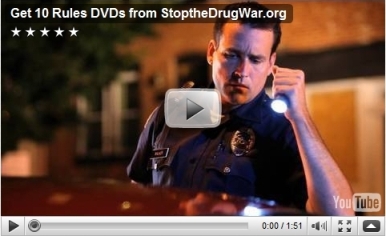 |
|
| 10 Rules is available with a donation to StoptheDrugWar.org now! |
|
"10 Rules" will help the both the entirely innocent and those guilty of nothing more of possessing drugs in violation of our contemptible drug laws reduce the harm of their run-ins with police. Not that it encourages the violation of any laws -- it doesn't -- but it does clearly, concisely, and effectively explain what people can do to exercise their constitutional rights while keeping their cool, in the process protecting themselves from police who may not have their best interests in mind.
Those stops and those arrests mentioned above, of course, were not random or evenly distributed among the population. If you're young, or non-white, or an identifiable member of some sub-culture fairly or unfairly associated with drug use, you are much more likely to be stopped, hassled, and perhaps arrested. The writers of "10 Rules," Scott Morgan and Steve Silverman of Flex Your Rights understand that.
Building on the foundation of their 2003 video, "Busted: A Citizen's Guide to Surviving Police Encounters," which featured mainly young, white people involved in police encounters, Morgan and Silverman have expanded their target audience. In three of the four scenarios used in the video -- a traffic stop and search, a street stop-and-frisk search, and a knock-and-talk home search -- the protagonists are a young black man, a young Latino man, and a black grandmother, respectively. In only one scene, two young men apparently doing a dope deal on the street, are the citizen protagonists white.
That's not to say that "10 Rules" is intended only for the communities most targeted by police, just that the writers understand just who is being targeted by police. The lessons and wisdom of "10 Rules" are universally relevant in the United States, and all of us can benefit from knowing what our rights are and how to exercise them effectively. "10 Rules" does precisely that, and it does so in a street-smart way that understands cops sometimes don't want to play by the rules.
"10 Rules" build upon the earlier "Busted" in more than one sense. While "10 Rules" is expanding the terrain covered by "Busted," it has taken the cinematic quality to the next level, too. While "Busted" was made using a beta cam, this flick is shot in High Definition video, and that makes for some great production values, which are evident from the opening scene. "10 Rules" was shot on a bigger budget that "Busted," it has more actors (including some drug reform faces you might recognize), and more professional actors, and it has more of the feel of a movie than most video documentaries.
And it has legendary defense attorney William "Billy" Murphy, who plays the role of socratic interlocuter in the video. (You may remember him from appearances on HBO's "The Wire.") Appearing in a courtroom-like setting before a multi-ethnic group of very interested questioners, the pony-tailed lawyer begins with a basic discussion of the rights granted us by the US Constitution, especially the Fourth, Fifth, and Sixth amendments dealing with the right to be free of unwarranted searches, the right to stay silent, and the right to legal counsel. His performance, folksy, yet forceful; scholarly, yet street-savvy, sparkles throughout; his natural charisma shines through.
From there, we alternate between Williams and his audience and the scenarios mentioned above. We see the young black man, Darren, get pulled over in traffic, produce a bit of bad attitude, and suffer mightily for his efforts. He gets handcuffed, manhandled, and consents to a search of his vehicle, after which the cop leaves his belongings strewn in the wet road and gives him a traffic ticket.
Then it's back to the courtroom, where Darren, angry and feeling disrespected, tells his tale. Murphy is sympathetic, but explains that Darren broke rule #1.
"Rule #1, always be calm and collected," the veteran attorney intones. "A police encounter is absolutely the worst time and place to vent your frustrations about getting stopped by the police. As soon as you opened your mouth, you failed the attitude test. Don't ever talk back, don't raise your voice, don't use profanity. Being hostile to police is stupid and dangerous."
Such advice may be frustrating, but it's smart, and it's street-smart. Murphy noted that things could have turned out even worse, as the video showed in an alternate take on the scene with Darren twitching on the ground after getting tasered for his efforts. He also threw in some good advice about pulling over immediately, turning off the car, keeping your hands on the wheel, and turning on an interior light just to reduce police officers' nervousness level.
Murphy uses the same scenario with Darren to get through rule #2 ("You always have the right to remain silent"), rule #3 ("You have the right to refuse searches"), rule #4 ("Don't get fooled" -- the police can and will lie to you or tell you you'll get off easier if you do what they ask), and rule #5 ("Ask if you are free to go"). This time, the cop still has a bad attitude and Darren still gets a ticket, but he doesn't counterproductively antagonize the cop, he doesn't get rousted and handcuffed, he doesn't allow the cop to search his vehicle, he doesn't get intimated by the officers' threat to bring in a drug dog that will tear up his car, and he does ask if he's free to go. He is.
Which brings us to a discussion of probable cause and and rule #6: "Don't expose yourself" and give police probable cause to search you. The video shows a car with bumper stickers saying "Got Weed?" "Bad Cop, No Donut," and "My other gun is a Tech-9" -- probably not a smart idea unless you really enjoy getting pulled over and hassled. More generally, "don't expose yourself" means that if you are carrying items you really don't want the police to see (and arrest you for), don't leave them lying around in plain sight. That's instant probable cause.
I'm not going to tell you the rest of the rules because I want you to see the video for yourself. But I will tell you about the heart-rending scene where the black grandmother lets police search her home in the name of public safety -- there have been some gang gun crimes, they explain pleasantly -- and ends up getting busted for her granddaughter's pot stash, arrested, and is now facing eviction from her public housing. Under Murphy's guidance, we rewind and replay the scene, with grandma politely but firmly exercising her rights, keeping the cops out of her home, and not going to jail or being threatened with losing her home.
In a time when police are more aggressive than ever, "10 Rules" is an absolutely necessary corrective, full of folksy -- but accurate -- information. "10 Rules" is the kind of basic primer on your rights that every citizen needs to know, it's well-thought out and well-written, and it not only is it full of critically important information, it's entertaining.
Go watch it and learn how to flex your rights. Better yet, watch it together with your friends, your family, or your classmates, then practice putting the rules into effect. Sometimes it's as simple as saying a simple phrase -- "Officer, am I free to go?" Do some role-playing, practice saying the magic words, and "10 Rules" can help you survive any police encounter in better shape than otherwise. When you're done, watch it and practice again -- familiarity is the best help when facing an intimidating police officer staring down at you.
We all owe a debt of gratitude to people who feel strongly enough about the rule of law in this country to help others learn how the law protects them and how to protect themselves within the law. A big thank you to the guys at Flex Your Rights is in order. And they would be the first to tell you the best way to thank them is to learn and apply the "10 Rules."
back to top
In a report released this week, the UN Office on Drugs and Crime (UNODC) announced that Afghanistan is now the world's largest cannabis producer, surpassing Morocco. Afghanistan is already well entrenched as the world's largest opium poppy producer as well, supplying more than 90% of the illicit global market for opium and heroin.

the opium trader's wares (photo by Chronicle editor Phil Smith during September 2005 visit to Afghanistan)
In the report, the
Afghanistan Cannabis Survey 2009, the UNODC estimated the extent of Afghan cannabis production at between 25,000 and 60,000 acres. While the number of acres under production is lower than in Morocco, the robust yields from Afghan cannabis -- about 90 kilograms of cannabis resin (hashish) per acre versus about 25 kilograms per acre in Morocco -- make Afghanistan the world leader in cannabis production, the UNODC said. Afghanistan is producing somewhere between 1,500 and 3,500 tons of hash a year, the report estimated.
"This report shows that Afghanistan's drug problem is even more complex than just the opium trade," said Antonio Maria Costa, head of UNODC in the report. "Reducing Afghanistan's cannabis supply should be dealt with more seriously, as part of the national drug control strategy."
Cannabis production is occurring in exactly half of Afghanistan's 34 provinces, the report found. It noted that production was shifting from the north -- the traditional locus of cannabis planting in the country -- to the south and east, the areas where the Taliban insurgency is strongest and the government presence weakest.
As with opium, some of the profits from the hash trade are ending up in the pockets of the Taliban. The insurgents typically siphon off millions of dollars by imposing taxes on farmers and smugglers to ensure safe passage of their goods.
"Like opium, cannabis cultivation, production and trafficking are taxed by those who control the territory, providing an additional source of revenue for insurgents," the report said.
The report estimates annual farm gate income from cannabis at between $39 million and $94 million a year, a fraction of the size of the opium trade, but still not an insignificant sum. Some 40,000 farm families generate income from cannabis growing, including families that are also growing opium. The UNODC said that farmers can earn a net income of $3,300 per year growing cannabis, compared to $2,000 growing opium.
For the UNODC, rising cannabis production should be responded to in the same way the West has responded to Afghan opium production. "As with opium, the bottom line is to improve security and development in drug-producing regions in order to wean farmers off illicit crops and into sustainable, licit livelihoods, and to deny insurgents another source of illicit income," Costa said.
But Afghanistan is arguably the home of cannabis, with strains like "Afghani" still highly valued by connoisseurs. It is difficult to imagine that there will ever be a time when there is no Afghani being grown in Afghanistan.
back to top
British Home Minister Alan Johnson told parliament on Tuesday that the government will seek to ban the synthetic stimulant mephedrone by April 16. The announcement comes after the Advisory Council on the Misuse of Drugs (ACMD) recommended last Friday that the drug be placed under the purview of the Misuse of Drugs Act.

mephedrone
"As a result of the council's swift advice, I am introducing legislation to ban not just mephedrone and other cathinones but also to enshrine in law a generic definition so that, as with synthetic cannabinoids, we can be in the forefront of dealing with this whole family of drugs," Johnson told parliament. "This will stop unscrupulous manufacturers and others peddling different but similarly harmful drugs."
The ACMD called for mephedrone to be scheduled as a Class B drug, with penalties of up to five years in prison for possession and 14 years for sales. Other Class B drugs include marijuana, amphetamines, and Ritalin.
Johnson also announced an immediate ban on the importation of the drug. It had been imported to Great Britain for sale as a plant fertilizer.
Mephedrone is derived from cathinone, the psychoactive ingredient in khat, the herb chewed in the Horn of Africa and the Arabian Peninsula. Khat produces a mild euphoric high similar to that from a couple of cups of expresso, but users have likened mephedrone's effects to those of cocaine or ecstasy. It has exploded in popularity in Britain in the past year, where it is known under a number of nicknames, including M-Cat and meow meow.
About two dozen deaths where mephedrone use was implicated have been reported so far in Britain, but it is unclear whether mephedrone itself caused any of those deaths. But that hasn't stopped prohibitionists from responding as they do to any new drug: Ban it!
That response doesn't sit well with former ACMD head Professor David Nutt, who was sacked last year following repeated criticism of the government for ignoring the group's recommendations and favoring politics over science in making drug policy. In an interview with the Evening Standard, Nutt called for "some sort of regulated use for MDMA or mephedrone where people, maybe in clubs, could have access to small amounts, safe amounts under guidance".
Such a policy would "probably be safer than what we're doing at the moment," he said. "For me, as a father with four children, aged 18 to 26, the drug that I know could kill my kids is alcohol. It is the drug that has caused the most damage to my kids' generation," he explained.
Nutt also criticized the ACMD for jumping on the ban bandwagon. "The ACMD could say that one confirmed death is enough evidence to make mephedrone a controlled drug, or they could say they believe in the precautionary principle, but neither of those is scientific and if they do go down that route then they will have lost scientific credibility. It is an open question whether mephedrone is more or less harmful than MDMA. We really don't know, but I would say that they are probably similar," Nutt added.
Meanwhile, street dealers are stocking up on meow meow in anticipation of price increases under the looming prohibition regime.
back to top
April 3, 1953: With the support of Allen W. Dulles, director of Central Intelligence, Richard C. Helms proposes funding for a biochemical warfare research program named MKULTRA, which among other things administers LSD to its unknowing participants.
April 2, 1988: The Economist editorializes in favor of bringing drug users within the law by allowing them to purchase limited doses of drugs that have been manufactured and distributed legally.
April 8, 1989: Miguel Angel Felix Gallardo is arrested in Mexico. Guillermo Gonzalez Calderoni leads a team of Federal agents who arrest the drug lord in a residential suburb of Guadalajara. Gallardo is imprisoned on charges relating to the kidnapping and murder of Enrique Camarena. His nephews, the Arellano-Felix brothers, inherit part of his drug-trafficking empire.
April 6, 1995: ABC News airs a special entitled "America's War on Drugs: Searching for Solutions" in which legalization is presented as an alternative to the failing war on drugs.
April 6, 1998: Dr. Dennis Rosenbaum's six year study of 1,798 students, "Assessing the Effects of School-based Drug Education: A Six Year Multilevel Analysis of Project DARE," finds that "DARE had no long-term effects on a wide range of drug use measures," that DARE does not "prevent drug use at the stage in adolescent development when drugs become available and widely used, namely during the high school years," and that "DARE may actually be counterproductive."
April 5, 2000: The Journal of the American Medical Association publishes "Trends in Medical Use and Abuse of Opioid Analgesics." The researchers conclude: "Conventional wisdom suggests that the abuse potential of opioid analgesics is such that increases in medical use of these drugs will lead inevitably to increases in their abuse. The data from this study with respect to the opioids in the class of morphine provide no support for this hypothesis. The present trend of increasing medical use of opioid analgesics to treat pain does not appear to be contributing to increases in the health consequences of opioid analgesic abuse."
April 6, 2000: The First National Clinical Conference on Cannabis Therapeutics convenes at the University of Iowa.
April 2, 2003: US Rep. Ron Paul asks the US Government Accountability Office (GAO) to investigate whether the Office of National Drug Control Policy violated the Congressional ban on spending funds on publicity or propaganda.
back to top
Along with our weekly in-depth Chronicle reporting, DRCNet also provides daily content in the way of blogging in the Stop the Drug War Speakeasy -- huge numbers of people have been reading it recently -- as well as Latest News links (upper right-hand corner of most web pages), event listings (lower right-hand corner) and other info. Check out DRCNet every day to stay on top of the drug reform game! Check out the Speakeasy main page at http://stopthedrugwar.org/speakeasy.

prohibition-era beer raid, Washington, DC (Library of Congress)
Since last issue:
Scott Morgan writes: "Embarrassing Typo on Anti-Legalization Site," "Drug Czar Doesn't Want to Discuss California's Legalization Effort," "Sting Says End the Drug War," "Medical Marijuana on South Park Tonight," "Drug Cartels Are Terrified of Marijuana Legalization," "Illegal Growers Are Terrified of Marijuana Legalization," "An Argument to Avoid Making, Part 2."
Phil Smith posts early copies of Drug War Chronicle articles.
David Guard posts numerous press releases, action alerts and other organizational announcements in the In the Trenches blog.
Again, http://stopthedrugwar.org/speakeasy is the online place to stay in the loop for the fight to stop the war on drugs. Thanks for reading, and please join us on the comment boards.
back to top
Do you read Drug War Chronicle? If so, we'd like to hear from you. DRCNet needs two things:
- We are in between newsletter grants, and that makes our need for donations more pressing. Drug War Chronicle is free to read but not to produce! Click here to make a donation by credit card or PayPal, or to print out a form to send in by mail.
- Please send quotes and reports on how you put our flow of information to work, for use in upcoming grant proposals and letters to funders or potential funders. Do you use DRCNet as a source for public speaking? For letters to the editor? Helping you talk to friends or associates about the issue? Research? For your own edification? Have you changed your mind about any aspects of drug policy since subscribing, or inspired you to get involved in the cause? Do you reprint or repost portions of our bulletins on other lists or in other newsletters? Do you have any criticisms or complaints, or suggestions? We want to hear those too. Please send your response -- one or two sentences would be fine; more is great, too -- email [email protected] or reply to a Chronicle email or use our online comment form. Please let us know if we may reprint your comments, and if so, if we may include your name or if you wish to remain anonymous. IMPORTANT: Even if you have given us this kind of feedback before, we could use your updated feedback now too -- we need to hear from you!
Again, please help us keep Drug War Chronicle alive at this important time! Click here to make a donation online, or send your check or money order to: DRCNet, P.O. Box 18402, Washington, DC 20036. Make your check payable to DRCNet Foundation to make a tax-deductible donation for Drug War Chronicle -- remember if you select one of our member premium gifts that will reduce the portion of your donation that is tax-deductible -- or make a non-deductible donation for our lobbying work -- online or check payable to Drug Reform Coordination Network, same address. We can also accept contributions of stock -- email [email protected] for the necessary info.
back to top
Want to help end the "war on drugs," while earning college credit too? Apply for a StoptheDrugWar.org (DRCNet) internship and you could come join the team and help us fight the fight!
StoptheDrugWar has a strong record of providing substantive work experience to our interns -- you won't spend the summer doing filing or running errands, you will play an integral role in one or more of our exciting programs. Options for work you can do with us include coalition outreach as part of the campaign to rein in the use of SWAT teams, to expand our work to repeal the drug provision of the Higher Education Act to encompass other bad drug laws like the similar provisions in welfare and public housing law; blogosphere/web outreach; media research and outreach; web site work (research, writing, technical); possibly other areas. If you are chosen for an internship, we will strive to match your interests and abilities to whichever area is the best fit for you.
While our internships are unpaid, we will reimburse you for metro fare, and DRCNet is a fun and rewarding place to work. To apply, please send your resume to David Guard at [email protected], and feel free to contact us at (202) 293-8340. We hope to hear from you! Check out our web site at http://stopthedrugwar.org to learn more about our organization.
back to top
Community Access, Inc. (CA) is a progressive not-for-profit organization that for the last 35 years has helped thousands of people diagnosed with psychiatric disabilities to make the transition from hospitals and shelters to independent living. CA's primary mission is to identify needs and create solutions for homeless people with psychiatric disabilities. Programs include over 800 units of supportive housing in three boroughs, the Howie T. Harp Peer Advocacy Center and Club Access.
The Harm Reduction Specialist provides engagement and support services, particularly to tenants engaging in risky behaviors such as drug and alcohol misuse, unsafe sexual practices, and self-harm, using a harm reduction model. The emphasis is on meeting individuals "where they are at" and providing non-judgmental, non-coercive services and resources to individuals engaging in risky behaviors. In addition, the Harm Reduction Specialist provides consultation, training, and support to program staff in their work with tenants engaging in risky behaviors. The intention is that the Harm Reduction Specialist will be a leader in forwarding Community Access' commitment to providing services using a harm reduction model.
Qualified candidates must have three to five years experience working with substance abuse and psychiatric disabilities; possess a thorough understanding of harm reduction; have a commitment to recovery oriented practice; and must be fingerprinted and cleared by the Office of Mental Health (OMH); have a minimum of a high school diploma or equivalent (GED) -- Bachelor's degree, preferred.
This is a Full-Time position; annual salary is low to mid 30K's, plus an excellent benefits package. Bilingual candidates are encouraged to apply.
Interested candidates should send their cover letter and resume to Community Access, 2 Washington Street, 9th floor, NY, NY 10004, Attn: HR Dept. or e-mail [email protected] or fax to 646-365-0458.
Community Access is an Equal Opportunity Employer. M/F/D/V. Women, People of Color and Members of the LGBT community are strongly encouraged to apply. CA is committed to the hiring of at least 51% consumer staff, in all of its departments and programs, and at all levels of management.
back to top


 It's here. The "10 Rules for Dealing with Police" DVD.
It's here. The "10 Rules for Dealing with Police" DVD. 